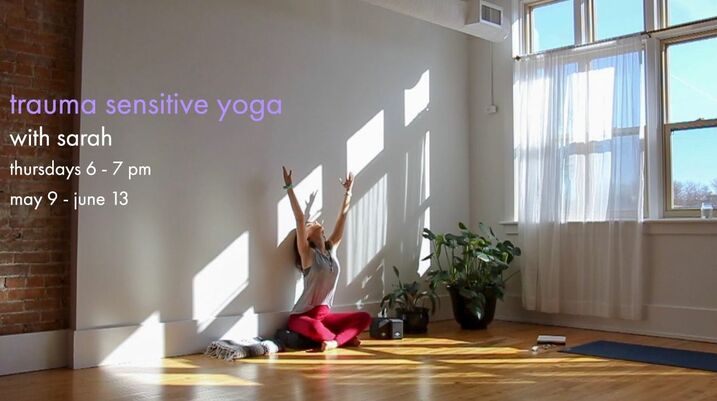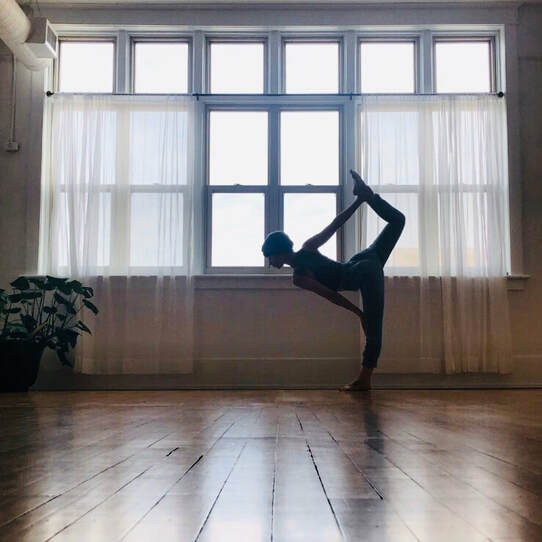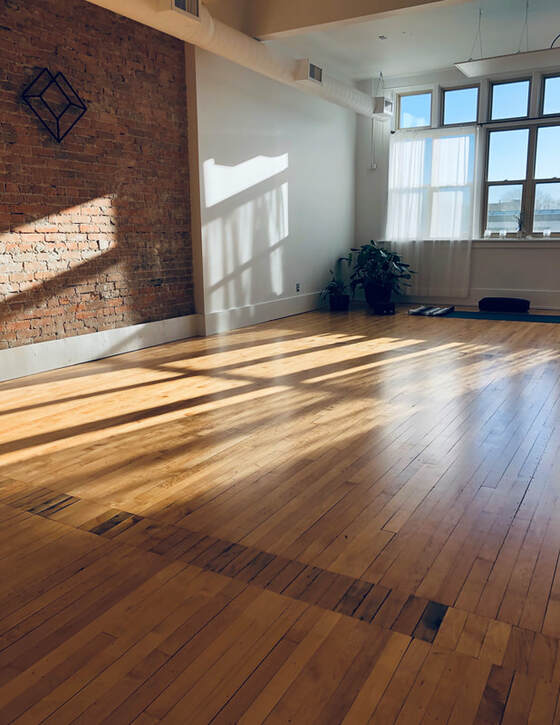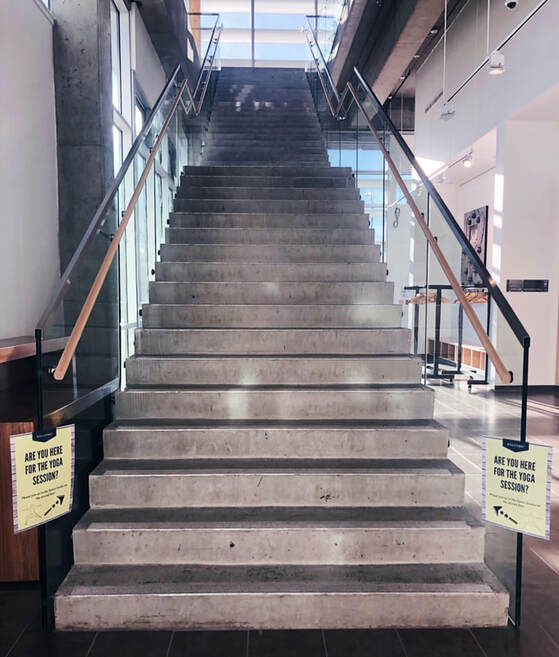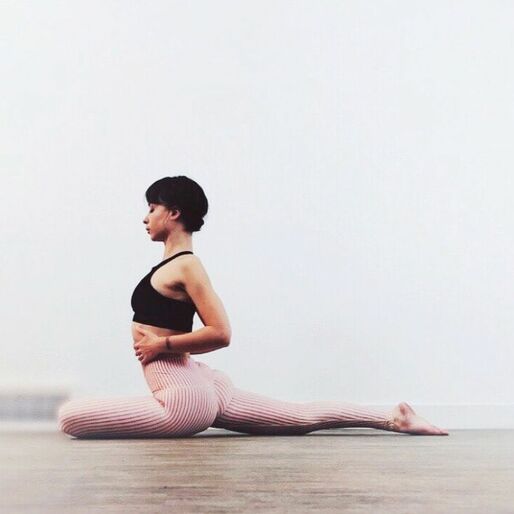|
Teaching yoga has always given me purpose and the practice itself has helped me heal some deep wounds. Long before I knew that trauma-sensitive yoga (TSY) was a thing, I knew that I had to find a way to bring this healing practice to those who really need it the most. Until now, I’ve only shared TSY in a private setting, so I’m honoured and (very!) excited to bring this practice to my beautiful home studio in downtown Lethbridge: HeartSpace. WHAT IS TRAUMA-SENSITIVE YOGA?Trauma-sensitive yoga (or trauma-informed yoga) is a practice that utilizes invitational language, emphasizes choice, and encourages an embodied experience through mindfulness and somatic exercises, gentle yoga asana and heart-based meditation practices. TSY is safe, supportive, needs-adaptive and exploratory. There is a focus on cultivating awareness of present moment experience, taking effective action, making empowered choices and creating stabilizing rhythms. In his book, Teaching Trauma Sensitive Yoga, Brendon Abram explains, "Yoga helps with trauma in three main ways. First, it takes our awareness away from a past event experience and into an experience of an event that is happening in the present moment. Second, it teaches us how to expand our window of tolerance to regulate physical, emotional and cognitive sensation. Third, it encourages us to explore the concept that we are connected to something greater than ourselves." I was trained with the Trauma Center Trauma Sensitive Yoga (TCTSY 20-hrs) model and I primarily use this methodology and philosophy to frame my classes; however, my approach largely draws upon my own experiences with yoga, trauma and healing from CPTSD. I have been teaching for 8 years and practicing for 11, but my experiences with trauma forever altered my relationship with yoga, I'm incredibly grateful for this opportunity to share the practice in this way at HeartSpace. THE HEARTSPACE TSY SERIESStarting May 9 and running for six weeks, we will meet every Thursday evening at 6pm for a gentle 60-minute yoga practice. Our TSY classes are inclusive to any individual who identifies with having experienced trauma, loss or grief, and will be open to both studio members and newcomers. While you are not obligated to attend every class (nor are you expected to share your story), we do ask that you register for these sessions in advance, as space is limited. The environment and group will be consistent and you are required to do only as much as you are comfortable with. HeartSpace is equipped with bolsters, blankets, blocks and mats, but you are welcome to bring your own props/mat if you'd like to. We respect your privacy; your personal information and participation in this class will be kept confidential. Trauma is a subjective experience and affects us to varying degrees. If you feel like this is the right class for you, it probably is; however, if you have any questions I'd be happy to chat and help you decide if our TSY offering at HeartSpace Studio is a good fit for you. (*email me: [email protected]*) If you're ready to join, register HERE
0 Comments
GETTING BACK ON MY MATThis topic has been difficult for me to even begin writing about because it's just so close to my heart, and I want to ensure I share this experience in the most authentic and open way possible. It was my own experience with trauma that led me to explore trauma-sensitive yoga (TSY), and because of those roots, teaching and sharing about this healing practice will always be very personal to me. However, for the sake of privacy and safety, I don't plan on speaking extensively about my personal experience with domestic abuse; instead, I'll be sharing a bit about my own recovery and journey with yoga for healing. My hope is that this connects to somebody who needs it and is enough to plant a seed. My intention is to continue sharing about my experience with TSY as I learn and grow as a facilitator, as well as to continue cultivating awareness about the power of yoga as a healing practice. I do want to note that trauma is complex and personal, and I am in no way recommending yoga as a replacement therapy; I'll simply be sharing about this particular healing modality as one tool on the path to recovery. In his book, Overcoming Trauma Through Yoga, David Emerson explains and clarifies this perfectly: "Trauma has a deep and long-lasting effect on the entire organism, from chemical and anatomical changes in the brain, to changes in our body's physiological system, to the subjective impact on the experience of the survivor. We believe that treatment for trauma must be equally thorough -- considering the person as a whole and addressing the broad-ranging effects of trauma on an individual. It also needs to meet the intensity of the traumatic sequelae with an equal measure of patience, compassion, and gentleness. If we are to help people recover from the insidious violation of their humanity that is trauma, we must be able to offer a varied array of tools to aid in this task. At the Trauma Center, we are beginning to understand how yoga can serve as one particularly effective tool for helping trauma survivors on their often long and complex path to recovery." Our bodies are the texts that carry the memories and therefore remembering is no less than reincarnation. - Katie Cannon Even with time, trauma can have a serious impact in the present. Some memories will actually manifest as real physical sensations; trauma makes itself at home in the body, like an unwelcome guest shaking up your peace and calm. As Bessel Van der Kolk puts it in his book, The Body Keeps the Score, "After trauma, the world is experienced with a different nervous system." In my experience, everything felt different. I was trying to survive and reorient myself in a world that no longer felt safe or worth engaging in. My body felt foreign to me, and my mind was like a battlefield keeping me trapped by the painful memory of what I'd been through. I thought that leaving the abusive environment would be enough to begin and really make progress in my healing journey, that removing myself would mean I was fine now, and able to move forward. But this was not at all how things unfolded for me. I moved into a new apartment with almost nothing and I slowly tried to rebuild a home - and a life - for myself there. I felt isolated, and I was afraid of what all the aloneness would bring me. At first, my mom was there to help get me settled and keep an eye on me. She took me to see my doctor and helped me explain what had happened when I wasn't able to speak. I was diagnosed with CPTSD (complex post traumatic stress disorder) and was prescribed anti-depressants, anti-anxiety meds and sleeping pills. The memory of those initial months still brings me deep sorrow. I'd have random flashbacks that would send me to the floor, shaking and crying in a fetal position until the intensity had subsided enough for me to pick myself up again. I tried to practice yoga, but my body wasn't ready and it would always end as quickly as it begun: with me sobbing into my mat. At first (and for a while), the only way I felt safe to express what was going on in my inner landscape was through painting. When I took my trauma-sensitive yoga training in 2017 (Trauma Center Trauma Sensitive Yoga, 20-hr program), this was one of the first things I wanted to ask -- What about those people who physically cannot manage a yoga practice without becoming triggered? What do you do when the pain is still too fresh? (The short answer was that the physical yoga practice isn't really for those people yet, unfortunately.) In my first year of recovery, just noticing that I had a body and bringing my awareness to my breath was excruciating. I felt broken, and I didn't want to spend time investigating a body that no longer felt like my own and a mind I couldn't trust. This made me even more frustrated, because I felt sure that yoga could help me but I just couldn't seem to get my body on board. I felt like a failure even as a survivor, like I was compromising my healing because I just simply wasn't strong enough. I'd used yoga to heal other injuries and past trauma, so why wasn't I able to get back to my practice when I needed it most? Before this trauma, I'd been practicing yoga for about 5 years and had been travelling and teaching yoga for a couple of years. It was the most important thing in my life and formed a huge part of my identity, but my abuser mocked and criticized my practice (and yoga in general) so much that I lost all confidence in it (and myself) and eventually stopped teaching and practicing all together. And then, when I was just beginning to feel ready to revisit my yoga practice, I had an accident that set me back, again. About 6 months after leaving my abuser, I had a fairly serious fall that resulted in a cracked skull and concussion, a broken wrist and a broken tailbone. Lying in the hospital bed that night, drifting in and out of consciousness, I felt completely lost and disconnected from my body. I couldn't feel my legs, my back and wrist were throbbing and I was bleeding from my head. Strangely enough, though, it felt all too familiar, like a representation of the emotional trauma I'd been living with for almost two years. Eventually, they sent me home, but advised me to have someone keep an eye on me for a while. I didn't have anyone, though, and I remember hoping that I'd simply fall asleep and not wake up. Sorrow prepares you for joy. It violently sweeps everything out of your house, so that new joy can find space to enter. It shakes the yellow leaves from the bough of your heart so that fresh, green leaves can grow in their place. It pulls up the rotten roots so that new roots hidden beneath have room to grow. Whatever sorrow shakes from your heart, far better things will take their place. Rumi Recovery, at it's core, is a journey of self-awareness and mindfulness, and of course, so is yoga; this makes TSY a natural fit and incredibly interesting to me as a healing tool. I've always deeply believed in the healing power of yoga, and because of the work of people like Bessel Van der Kolk and David Emerson, we're now able to put some scientific merit behind this belief. I can't adequately express my gratitude that there are individuals and organizations out there dedicating their lives to helping others heal, and I truly don't know where I'd be had I not found my way back to these influences. After my diagnosis of CPTSD, I needed something concrete and tangible to give me hope in my own ability to heal, and while it took me a while to get there, TSY serendipitously found it's way into my life over three years later. (I'll get back to this in a future post!) My own return to yoga practice came prior to my discovery of TSY, and it was the most difficult thing I've ever done. My healing process has been gritty, unpredictable, and long; a true blood-sweat-and-tears mission. I spent about six months building up my home practice, starting out at only 10 minutes or so -- just as much as I could handle. I'd lost all of my strength and flexibility from both emotional and physical trauma and was still dealing with excruciating pain in my tailbone and sacrum. I cried through most practices, either because of my pain or the thoughts and feelings that would arise as I journeyed inward. I was meeting myself again, but a damaged, vulnerable, terrified version of myself I wasn't familiar with; it took a long time to befriend my shadow side and truly invite all parts of myself to the mat. But this journey reminded me that there was someone in there worth saving, worth fighting for and showing up for every day. I still work on seeing the beauty of my experience with trauma in a broader sense, recognizing the growth it's brought me, and the beautiful relationships that would never have existed without it. Healing is a process, and a daily practice, but I made a vow to myself a few years ago that I would not give up, no matter how dark things got, and that determination has been the driving force of my recovery. We can hardly bear to look. The shadow may carry the best of the life we have not lived. Go into the basement, the attic, the refuse bin. Find gold there. Find an animal who has not been fed or watered. It is you! This neglected, exiled animal, hungry for attention, is a part of yourself. Marion Woodman Fast forward a few years later (if you're still with me, bless your patient heart!), and I'm looking out into a room of beautiful yogis, eyes closed with a soft expression on their faces, light-beams pouring into the studio and dancing across their mats, the calm but palpable energy surrounding us -- and I'm overcome with gratitude and love. Somehow, I've survived. Somehow, I've returned to this sacred practice, not only as a student but also as a teacher - I get to simultaneously be an explorer and a guide. And I'm here because I want to show you that there is hope. I want to remind you that for as many reasons that you can find to give up there are always more for holding on. I still cry, like, every day, but more often than not, they're tears of joy. I'm astounded by the resilience of the human spirit, and I will never stop sharing this message: HEALING IS POSSIBLE & EVERYTHING IS GOING TO BE OKAY As I embark on this new journey as a TSY facilitator, I will continue to share about my experiences and observations. If this resonates with you in some way, I hope that you'll continue to follow along with this series and reach out if you have any questions or feel compelled to connect.
|
